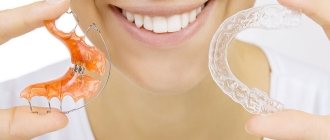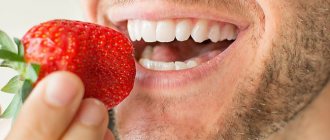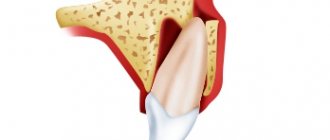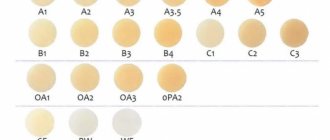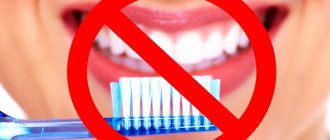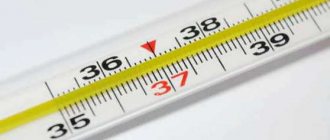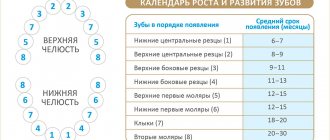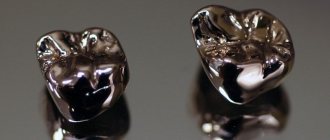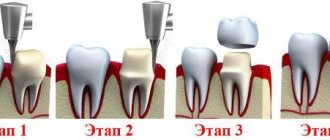At what institute do they study to become a dentist?
Dentists of all specialties receive education exclusively at higher medical educational institutions (universities and academies), like all other doctors.
If you think that studying to become a dentist is easier than other medical specialties, this is not so. Dentistry is an equally serious and difficult branch of medicine, requiring high professionalism and qualifications from the doctor.
There is also the option to start a career as a dental technician or dental assistant. These specialties can be obtained at medical schools and colleges by entering there after 9th grade. Graduates of these institutions have the opportunity to start a career in 2-3 years, and if desired, they can continue their studies at universities (although not everyone can bear such a load).
Without appropriate education it is prohibited to practice medicine
Attention! Without a diploma from a medical university, it is prohibited to practice medicine.
Subjects for 11th grade graduates
A certificate of complete secondary education is obtained after successful completion of schooling. This gives the right to choose a university, submit documents to it and enroll in the chosen specialty.
What exams must be taken by eleventh-graders, dentists, for admission to a higher educational institution:
| Chemistry: | Having deep knowledge in this discipline, you will be able to enter a prestigious educational institution. |
| Biology: | An excellent knowledge of human anatomy and genetics will be required. |
| Russian language: | When entering medical faculties, knowledge in this discipline is also necessary, so it is better to “pull up” your knowledge of the Russian language in advance in order to pass the exams successfully. |
Naturally, when applying to become a dentist, you will have to pay special attention to chemistry and biology. Russian and mathematics are considered general disciplines and are not directly related to the profession. But they will affect the overall score, so it is better to successfully pass all exams so that the passing score is higher, as are the chances of admission.
Many universities, especially prestigious ones with a high passing grade, are tightening their selection. They conduct testing that helps teachers evaluate applicants' knowledge. In this case, upon admission, the commission evaluates not only the Unified State Examination results, but also the test results.
Testing is considered a higher priority than the Unified State Examination score; this gives young people who did not pass the exams very well a chance to enter their chosen specialty and still become a dentist.
If preparation for additional testing is not part of the applicant’s plans, then he should choose an educational institution that does not conduct such tests. And those wishing to enroll are “weeded out” in a different way, based on the results of exams in specialized disciplines.
In this case, it will be enough to pass the Unified State Exam successfully to get a passing grade and be enrolled in the chosen university.
What exams do you need to take to become a doctor?
In most medical universities, upon admission you must pass the Unified State Exam (USE) in the following subjects:
- Russian language
- Chemistry
- Biology or Physics
Also, to obtain a school certificate, you must pass the Unified State Examination in mathematics.
Attention! The competition for budget places in the specialty “Dentistry” is very high, so if you do not have the opportunity to study in a paid department, the points scored based on the Unified State Examination results should be maximum.
Core subjects: list and features of study
Schoolchildren who dream of becoming dentists should understand that this profession is not only prestigious, but also very responsible. Even before entering a university, while studying at school, you should pay special attention to your knowledge in the disciplines that are basic for enrollment in Dentistry, and, if necessary, “pull up” them.
The lists of combinations of main Unified State Exam subjects may differ among universities. There are four types of Unified State Exam combinations for admission to the specialization “Dentistry”:
- Mathematics, Russian language, chemistry.
- Russian language, biology, chemistry.
- Russian language, chemistry, foreign language.
- Russian language, physics, chemistry.
In our article we propose to take a closer look at each of the above items.
Any difficulties?
Need teacher help?
We are always happy to help you!
master's theses
Mathematics
Why is this discipline needed in dentistry? Mathematics teaches:
- ability to collect and systematize tasks;
- development of logical thinking,
- find different solutions to the problem,
- correctly calculate the proportions (for example, the dose of administration of a medicine),
- develop the habit of bringing what you start to fruition.
Russian language
The breadth of one's vocabulary says a lot about a person. It allows you to communicate seamlessly with many people. In addition to vocabulary, literacy is very important. The Russian language is primarily necessary in order to:
- correctly build a constructive dialogue with the patient;
- correctly describe the situation (diagnosis) orally;
- correctly describe the medical history in writing, etc.
Chemistry
This subject is considered a core subject when applying to become a dentist. It needs to be known at the highest level. Knowledge in the field of chemistry is necessary in a future profession to understand:
- what painkillers and antiseptics are allowed to be used at work;
- what solutions, alloys, “cements” can be mixed to install fillings and seal canals;
- what safe proportions of drugs are allowed;
- what materials are used in the manufacture of crowns;
- methods, uses of whitening and much more.
Physics
It should be noted that not all universities require excellent knowledge in this subject. However, when entering medical schools, you should still have them at least at a basic level. When studying to become a dentist, the following knowledge will be very useful:
- physical properties of materials (color, density, thermal conductivity, strength, ductility, shrinkage);
- expansion coefficients of fabrics, materials, metals;
- laws of quantum physics (for example, when using dental lasers).
Biology
This school discipline is also one of the core subjects for admission to dentistry. In the process of dental treatment, not only the physical and chemical properties of materials or components are taken into account, but also the following parameters:
- way of building the nervous system;
- factors that influence her condition;
- structure, state of the human immune system and the reason for the influence on it;
- structure of soft tissues and their study.
Foreign language
A foreign language is not a required subject for admission to the Faculty of Dentistry. However, some universities in the Russian Federation during the entrance campaign require confirmation of knowledge in the field of foreign languages with a Unified State Examination certificate. Usually this is English, but other languages are not excluded. Details regarding the full list of subjects required for admission must be clarified at each individual university. So does a future dentist need a foreign language?:
- More opportunities open up for an applicant who is fluent in English. He can be one of the first to be aware of both trends in dentistry and medicine in general. Knowing English at the proper level, you can study textbooks, medical journals from foreign publishers, and also read articles in the original that are posted on medical websites.
- English will also be useful for those who plan to undergo an internship or work in other countries in the future.
- New opportunities are opening up to participate in medical conferences outside the country.
- Upon graduation, a dentist who speaks English can accept foreign patients.
- Knowing a foreign language, a student can get an education in almost any country in the world. Moreover, today you don’t need to spend your entire fortune to do this.
Tooth structure
How many years to study?
A future dentist can begin independent work after studying at a university and completing a residency, that is, after 7–8 years.
After the 11th grade, the period of study at a university is 5 years. But such a diploma does not allow you to immediately start working. It is necessary to complete an internship or residency (depending on the specialization - 1-3 years). Thus, the total period of training for a specialist is 7-8 years.
Reference. Some 9th grade graduates prefer to first study at a secondary specialized medical educational institution (2-3 years), and upon completion they enter universities and academies. In this way, young people better master specialized subjects and have the opportunity to experience all the intricacies of the profession in advance and decide whether they want to devote their lives to medicine.
Future profession
The specialty program is structured in such a way that the student gets acquainted with a wide range of important disciplines, gains practical skills, and learns research and organizational work. As a result, he is able to solve various professional problems. First of all, this is expressed in the provision of specific medical care to the patient. In his work, the young doctor is guided by the latest achievements of science and chooses humane means and techniques. Of course, he cannot do without the ability to correctly diagnose. A specialist can also engage in expert work. He has the right to apply for managerial positions, supervising junior and middle staff.
Advantages and disadvantages of the profession.
Like any other, the dental profession has its advantages and disadvantages, which should be carefully studied before entering. Studying and then working in dentistry requires great emotional, physical, and sometimes material costs, so it is better to avoid mistakes when choosing this activity.
Advantages:
- High demand for specialists in the labor market
- Decent salary
- Various options for professional development (medical, scientific career, own business, etc.)
- Prestige and respectability
- Satisfying the desire to be useful, to help people, to see the results of one’s work
- Possibility of self-realization, creative component
Flaws:
- Difficulty in applying for government-funded places due to high competition, high tuition fees
- Long-term training and regular professional development
- High emotional and physical stress
- Occupational diseases (osteochondrosis of the cervical vertebrae, etc.)
- Long working hours (especially at the beginning of a career).
- Work without room for error
Profession dentist: pros, cons, who is suitable
A dentist is a doctor who treats teeth. People come to him for pain, damage to teeth, inflammation of the gums and other problems. These doctors often provide aesthetic services, such as teeth whitening or bite correction.
There are several specializations:
- Pediatric dentist. Deals with dental problems in children.
- Adult doctor. Treats people over 18 years of age.
- Surgeon. Removes teeth and performs other operations.
- Orthopedist. Places dentures, veneers, crowns.
- Orthodontist. Performs procedures aimed at straightening the dentition.
After receiving education, a doctor can work in a public or private clinic. Those who have entrepreneurial skills eventually open their own dental offices. There is also the opportunity for career growth from an ordinary employee to a manager.
The main advantage is the demand for the profession. Every person turns to such doctors at least once every few years. In addition, the profession is considered one of the highest paid among doctors and allows you to help people. Among the disadvantages are:
- greater responsibility;
- heavy stress (mental and physical);
- stress.
A responsible, patient, and detail-oriented person can become a successful dentist. But for those who are not able to perform monotonous work or are sensitive to physiology, for example, cannot look at blood, it will be difficult.
Main stages of training.
After entering a university, the student will have to study there for 5 years, of which the first 2 years are spent mastering theoretical knowledge, and medical practice begins in the third year. After defending the diploma, the graduate is required to continue his studies in an internship or residency, upon completion of which he is issued a specialist certificate giving the right to conduct practical activities.
Reference. Residency training takes place in the following specialties: dental therapist, dental surgeon, maxillofacial surgeon, orthodontist, orthopedic dentist, pediatric dentist.
After five years of studying at a university, the future dentist needs to decide on a specialization for residency training.
You can decide which direction to choose while studying at the university, assessing all the pros and cons, as well as compliance with the requirements for the specialty.
MIIT Medical College
The college is a structural subdivision of the Moscow State Transport University, and trains paramedical personnel for medical institutions of the Russian Railways system. It is also a clinical base for students’ practical training. Graduates of the specialty “Orthopedic Dentistry” are guaranteed 100% employment in hospitals and clinics of the Moscow railway transport. You can only get a dental technician profession here for a fee; the cost of training is 90 thousand rubles per year.
List of universities that teach dentists.
There are about 50 higher medical educational institutions (state and non-state) in Russia, where they teach in the field of Dentistry.
Important! Before applying to a non-state university, you need to make sure it has a license and accreditation, and also study its reputation in the labor market.
Listed below are the main and most significant metropolitan and regional universities, whose graduates are especially valued in the labor market. You can enroll in places financed from the budget or study on a commercial basis.
Moscow:
- First Moscow State Medical University named after I.M. Sechenov
- RNRMU named after N.I. Pirogov
- Peoples' Friendship University of Russia
- MGMSU named after A.I. Evdokimova
Saint Petersburg:
- First St. Petersburg State Medical University named after academician I.P. Pavlova
- Northwestern State Medical University named after I.I. Mechnikov
- St. Petersburg State Pediatric Medical University
Regions:
There are dozens of public medical universities in the regions, which makes it accessible to become a dentist even in the most remote areas of the country.
The highest positions in the rankings are occupied by:
- Northern State Medical University (Arkhangelsk)
- Kazan State Medical University
- Siberian State Medical University (Tomsk)
- Orenburg State Medical Academy
- Samara State Medical University
- Irkutsk State Medical University
- SSMU named after V.I. Razumovsky (Saratov)
- Nizhny Novgorod State Medical Academy of the Ministry of Health and Social Development of the Russian Federation
- Kemerovo State Medical Academy
- Tyumen State Medical University
- South Ural State Medical University (Chelyabinsk)
Acquired skills
This course teaches the future dentist many valuable skills:
- dental examination;
- recommendations for oral care;
- selection of toothbrush and paste;
- teeth brushing training;
- diagnosing dental diseases;
- treatment of diseases;
- anesthesia;
- simple orthopedic treatment;
- professional hygiene;
- hygienic procedure for persons who have undergone surgery in the jaw and face;
- working with modern dental equipment;
- participation in investigative and judicial actions;
- sanitary treatment of premises;
- filling out medical documentation;
- management of medical staff (junior and middle management).
Preparatory courses ZNO
All medical schools organize courses to prepare for dental entrance exams. For example, Kharkov Medical University is recruiting people for evening or correspondence courses. Here, future students study Ukrainian language and literature, biology, chemistry, physics, and mathematics. The duration of training is from October 1 to April 20.
Vinnytsia Medical University conducts preparatory classes in several formats: full-time, part-time, evening courses, and on weekends. They are accepted after 9th and 11th grades, as well as graduates of schools and technical schools, colleges, and gymnasiums. Basic courses last 8 months, and intensive courses last 2 months.
In these courses you can prepare for passing the External Test and entering the chosen university. The cost depends on the institution. At Bogomolets University, for each subject chosen for study, you need to pay 3,520 UAH (for full-time classes) or 2,100 UAH (for correspondence classes).
The sooner you decide on admission to the desired medical school, the easier your preparation and further training will be. This is especially important for future dentists!
Dentist is a general definition of doctors who conduct dental practice in the prevention and treatment of diseases of the oral cavity, jaws and teeth. Although it is popular among people to call all “dental” doctors dentists, their internal career guidance is much more complicated. Usually we come to an appointment with a dentist-therapist who has a wide profile. He is the one who treats caries, puts fillings, and restores teeth. The periodontist is responsible for the treatment of the mucous membrane and soft tissues (gums, palate, etc.). An orthodontist is involved in straightening the position of teeth and correcting the bite, and an orthopedist is involved in dental prosthetics. Standing apart from everyone else is the dental surgeon, a specialist in surgical treatment for the most complex diseases. And, of course, the pediatric dentist helps the youngest patients.
Basic responsibilities of a dentist
The responsibilities of a dentist include:
- conducting diagnostic and preventive visual examinations;
- prescription of additional research methods;
- making diagnoses based on the data obtained;
- prescribing medications;
- provision of emergency medical care if necessary;
- knowledge of the basics of maxillofacial surgery and anatomy;
- tooth extraction;
- placement of fillings;
- compliance with the principles of prof. ethics;
- understand and comply with all laws and work regulations.
The average salary of employees by region varies between 40-70 thousand rubles per month. Earnings in large cities range from 50 to 100 thousand rubles. In Moscow and St. Petersburg, dentists can earn up to 100-160 thousand rubles per month. The salary of workers depends on various factors: on the medical institution, region and qualifications of the specialist.
Qualities required for a professional:
- accuracy when working with dear prof. equipment and the patient’s oral cavity;
- curiosity;
- broad outlook in all branches of medicine;
- excellent memory;
- tact;
- goodwill;
- stress resistance;
- patience when dealing with difficult patients;
- ability to resolve conflicts at the initial stage;
- speed of reaction in emergency situations.
The main thing for a professional is love for his profession and the desire to help sick people.
Where can a dentist work?
Commercial dentistry is now leading the way in providing jobs. The state is pursuing a policy that supports medical workers, providing decent wages, high pensions and the opportunity to purchase subsidized housing.
This profession will always be popular and relevant, because every person has been a patient of a dentist for almost his entire life.
